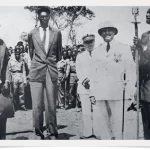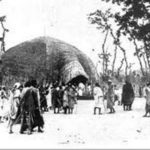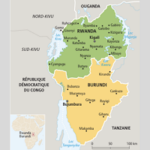The Changing of the Guard under Colonial Rule
The death of Rwabugiri, the Rwandan conqueror, led to the withdrawal of direct Rwandan power from Ijwi. But the reestablishment of the royal Sibula line in the southern part of Ijwi after the death of Rwabugiri did not signal a new era of sovereignty unimpeded by external influences. Ijwi was soon to find itself a part of the disputes between Germany and Belgium over the location of colonial territorial boundaries (1899–1910). Belgian officers established a military post on Ijwi in 1912,and about a year later Kabego’s successor Ndogosa was officially recognized by the Belgian authorities as “Chief of Kwidjwi.”
Throughout the island the population found their early experience of Belgian occupation burdensome, but the initial impact was especially severe in the south. Ijwi oral traditions still reflect these tensions today.Belgian officers andtheir Congolese soldiers requisitioned large quantities of food; it is recounted that they demanded 350 fish daily, a bull each week, and numerous chickens and eggs. They also introduced the population to corvée (forced and the chicotte (whip). Cattle raids were a frequent occurrence.A misunderstanding soon arose between the Belgians and Mugenzi, oldest son and local delegate in the far south; at issue was a shortage one day in the number of fish delivered to the post. During the course of this dispute, Mugenzi and Ndogosa and many among the population went into hiding, and the Belgian forces set fire to residence.
During World War I, Ijwi again became the focus of German-Belgian rivalries. In September 1914, a German force from Rwanda attacked and defeated the Belgian installation on Ijwi; the Belgian officers were taken prisoner, and the Germans occupied the island. The Belgians suspected that Ijwi authorities had cooperated with, if not actively aided, the German offensive. Therefore, despite the
that the German presence on the was only nominal and ephemeral, on the retreat of the Germans and the Belgian reoccupation of Ijwi in 1916, the Belgians looked with great suspicion at the Ijwi royal family and viewed them as former German sympathizers. This suspicion was reflected in Belgian administrative policy and was to color the relationship between the Belgians and Ndogosa, the king of Ijwi, for the next decade.
Belgian exactions on the island were viewed as onerous by both the population and the royal family, but the latter, of course, also saw the demands as a direct threat to their sovereignty. In neighboring Rwanda, the Belgians took over from the Germans a minimal but nonetheless functioning administrative structure, built in part on the earlier structures of the Rwandan kingdom. On Ijwi, however, the Germans had established nothing even remotely comparable, nor were there effective preexisting structures of the type found in Rwanda. Nonetheless, the Belgians pushed ahead as if similar administrative structures were fully in place, and they considered Ndogosa’s lack of cooperation to be “rebellion.” In fact, it was much more than that: it was a fully committed effort to preserve sovereignty in the face of yet another external threat. It was not Ndogosa’s intransigence alone, for to comply with Belgian demands would have violated indigenous constraints on kingship and compromised Ndogosa’s position as king on Ijwi. Furthermore, the Ijwi kingdom lacked sufficiently strong administrative structures to extract such demands from an unwilling population even had the king so wished. It would have been almost impossible for him to comply with Belgian demands without relying on European force and thus forfeiting both internal support and external independence—important constituents of legitimate claims to kingship on Ijwi. Consequently, the goods and services demanded of the Ijwi king were slow in forthcoming, and it was not long before the Belgians sought to exile Ndogosa and replace him with a man of their own choosing.
Ndogosa had not regained his throne from the Rwandans simply to hand it over to the Belgians, however. At that time the island included substantial areas of heavy forest, and Ndogosa faded from Belgian contact.It is a commentary on the unity of general population on this issue that Ndogosa was able to maintain his authority with the people of Ijwi (at least those in the south) while hidden from the Europeans for more than seven years (1913–14 and 1916–23). Even though not all of the population was privy to his hiding places, he could not have maintained his tactics without the support of most Bany’Iju (the people of Ijwi), especially in the face of constant attempts by the Belgians and their soldiers to locate him.
In their search for the elusive Ndogosa, the Belgian administration imposed additional burdens besides the “normal” requirements of taxation, prestations in food, and, most onerous, cutting timber in the forests of the island. Now the population had to support, as well as to endure, the presence of a quasi-permanent military occupation. Certain individuals, those thought to be close the king,suffered especially under this regime; some were killed in the most barbaric fashion.All this, of course, took place in the name of imposing peace and tranquility.Further disruption occurred from the indiscriminate and widespread expropriation of cattle by colonial authorities both on and off Ijwi (from Rwanda and the Congolese mainland).It was also a time of cattle epidemics and human diseases, with spinal meningitis taking a particularly grim toll.The herds on Ijwi diminished greatly, never to revive, and human mobility increased as islanders sought to escape the exactions.Bany’Iju today recount that many people, including many members of the royal family, were jailed or sent into exile for refusing either to divulge Ndogosa’s hiding place or to carry out European demands with the proper zeal. According to the Belgian colonial reports, many fled to neighboring areas and had to be searched out and returned to the island during this period.Both sources were probably right. Either one alone would testify to the turmoil of the times but taken together they demonstrate the depth of disruption of Ijwi society. One Belgian observer described the situation in the following terms: “During all this period the most complete anarchy reigned in the region. The occupation ruined the country, the natives left the island to take refuge in the chiefdoms on the mainland, in Buhavu, as well as in Unya-Bongo [the Shi states southwest of Lake Kivu] and in Rwanda, where many settled without the intention of returning.”
From 1920, the Belgian administration initiated a series of new policies designed to terminate the resistance on Ijwi and reinforce administrative control. First, Ijwi lost its status as a territorial headquarters; in 1920the administrative center of what had been the “Territoire de Kwidjwi” was moved from Ijwi to the Congo mainland at Kalehe. Second, the administration moved to reinforce and extend the power of Lushombo, the Havu king of Mpinga (the area around Kalehe). By a decree (arrêté) of August 13,1921, the Buhavu Chiefdom was created, with Lushombo as “Grand Chef.” In addition to Mpinga, therefore, Lushombo’s domain now included Ijwi and several other chiefdoms, most of which, like Ijwi, had formerly been autonomous of this Havu chief.By 1928, those chiefdoms had all been officially demoted to the status of “sub-chiefdoms” (later termed “groupements”).These policies marked a definitive shift in the locus of power in the region. The political arena was enlarged, both in area and in the scope of powers available to the authorities within the hierarchical network. Formerly in-dependent areas now became subordinated not only to the colonial authority, but (and symbolically equally significant) also to other mainland areas. It now became essential for political authorities such as those on Ijwi to develop alliance networks on the mainland, both with the Belgian administration and with Lushombo’s following; the Ijwi royal family had always resisted both.
During this period the Belgians considered the southern part of Ijwi to be the major problem area of the island because of their difficulty with Ndogosa. Thus they were delighted when, in 1921, Ndogosa’s oldest son, Mugenzi, presented himself to the administration and assured them that if they would recognize him as chief, he would locate his father and brothers and turn them over to the Belgian authorities within six months.But though he exiled several of his brothers, he failed to locate Ndogosa, and finally was exiled himself, two years later, to South Kivu. Shortly thereafter, Ndogosa emerged from hiding. Faced with the realization that the Belgians were there to stay, discouraged with the purposelessness of continued resistance, and apparently upset by the conduct of his son Mugenzi and the sufferings of his other sons in exile, Ndogosa surrendered to the Europeans in 1923.
For the first time in more than seven years, Ndogosa was allowed to govern in public. The results, however, were exceedingly disappointing to the Belgian administration. The Europeans had hoped that the restoration of Ndogosa would bring about a change in attitude of the Ijwi population; they wanted people to return to their villages, to pay taxes, and to participate in corvée, and they wanted the king to act in a respectful and helpful manner toward the Belgian authorities. None of these expectations was fulfilled. In March 1926, the Belgian commissaire de district assistant, Monsieur Dargent, went to Ijwi to look into the situation personally. The following conversation between Dargent and Ndogosa gives an idea of the immense gap between Belgian views and Ijwi attitudes on the king’s status.
Q: Have you received all my notes? Why did you remain eight days without coming to greet me, while I summoned you each day?
R :If I did not come to you when I received all your notes, it was because I was sick and I have not been able to walk [far].
Q: Why did your people flee from me, instead of remaining in their homes for my arrival?
R: If they fled, that is their business; I can’t do anything about it.
Q: If you had sent someone to warn the people that I was coming, and to tell them to stay around, they would have stayed, isn’t that so?
R: If you are the master, take care of such palavers yourself.
Q: Have your sons killed someone, or do they want to make war? [Is this why they aren’t able to appear before the administration?]
R: You will see my children only on condition that you return to me all my country that I had in the past.
Q: You have come alone, without any of your children, and none of your notables—why?
R: What do you bring to me here? I will not show anyone to you and no one will come, as long as I have not received what I am asking from you.
Q: Which one of your sons is going to succeed you?
R: Could you tell me as well which one from among your sons will be commissaire?
Q: You answer me as if I were your equal or your inferior. I repeat, I want to see your sons, among others Rutwaza, the one designated by custom to succeed you.
R: You will not see him.
Within the week, Ijwi was again subjected to a “regime of military occupation,” which was to last until 1929. The justification given for this extreme measure was as follows: “The natives of the sub chiefdom Mihigo Ndogosa on Ijwi Island are in a state of collective non-submission characterized by the systematic disappearance of people upon the approach of agents of the government and the population opposes the normal execution of our laws. Despite different exhortations and solemn summons we have not managed to overcome the resistance of these people…. It is necessary to take measures to influence the attitudes of these populations.”
Only a few weeks after this decree was issued, Ndogosa was sent into exile at Rutshuru, never to return. During the following months, those sons of Ndogosa who had not already been exiled were deported from the island. After almost two years in exile, Ndogosa died on February 9, 1928. He was buried in Rutshuru (in North Kivu), and the people of Ijwi observed the customary rites of mourning to honor their proud king.In October of the same year, the “Chefferie Mihigo” was officially abolished by Belgian decree.
With the death of Ndogosa and the exile of Rutwaza, the last of his sons remaining on the island, Ijwi administration was thereafter in the hands of the Belgians. But still they lacked a convenient instrument through which to extend their newly achieved domination.Their policy of using traditional chiefs was obviously unworkable, because they themselves had deported the entire family of the legitimate king. They reached more widely, therefore, calling on Bera, who had since been returned from his self-imposed refuge in Rwanda by an earlier call from the Europeans. During the turmoil and uncertainties in the south of the island after 1916, the Belgians had delegated authority in the north to twomen: Nantegeza, the son of Bikuba, Ndogosa’s full brother; and Bera, the son of Tabaro. Bera turned out to be a willing, even eager, colonial factotum, and his long residence in Rwanda had fully acquainted him with the techniques and rewards (at least for those within the political hierarchy) of a class-based administrative system. But Nantegeza experienced the same difficulties relating to the imposition of externally based power as other members of the royal family; he was soon also assured of exile when he offended Lushombo, the newly appointed grand chef of the Havu kingdoms, by failing to produce the requisite number of cattle demanded, and his domain fell to Bera.Having consolidated his power in the north, Bera did well; the colonial reports on him during the early 1930s are filled with glowing praise: “very dedicated,” producing “much good work … and very satisfying results from native tax collection and various assignments. «On Ndogosa’s surrender and exile, Bera was named to rule over the entire island. Here was the colonial creation of a “traditional” authority.
https://uk.amateka.net/the-changing-of-the-guard-under-colonial-rule/https://uk.amateka.net/wp-content/uploads/2021/03/colonial.pnghttps://uk.amateka.net/wp-content/uploads/2021/03/colonial-150x150.pngChanges and ColonialismSocial & cultureThe death of Rwabugiri, the Rwandan conqueror, led to the withdrawal of direct Rwandan power from Ijwi. But the reestablishment of the royal Sibula line in the southern part of Ijwi after the death of Rwabugiri did not signal a new era of sovereignty unimpeded by external influences. Ijwi...BarataBarata rpierre@ikaze.netAdministratorAMATEKA | HISTORY OF RWANDA



